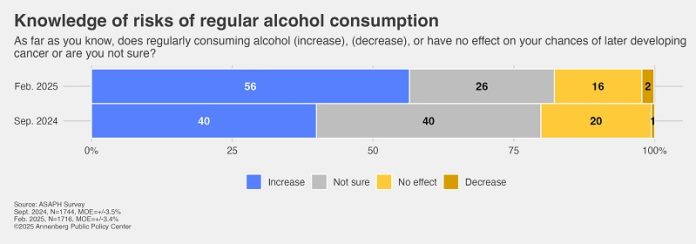
More people in the U.S. now understand that drinking alcohol regularly can increase the risk of cancer, according to a new survey by the Annenberg Public Policy Center at the University of Pennsylvania.
The survey, carried out from January 30 to February 10, 2025, asked over 1,700 adults about their views on alcohol and cancer.
It found that 56% of people believe that regularly drinking alcohol raises your chances of getting cancer later in life.
This is a big jump from just 40% in a similar survey done in September 2024. At the same time, fewer people now believe that alcohol has no effect on cancer risk (down from 20% to 16%), and fewer say they are unsure (down from 40% to 26%).
This change in awareness may be linked to a public warning released by U.S. Surgeon General Dr. Vivek Murthy on January 3, 2025.
His message said that alcohol raises the risk of at least seven types of cancer, including breast, colon, and liver cancer. The warning, which got a lot of attention in the news, also suggested putting updated warning labels on alcoholic drinks.
The survey found that about half of the people (48%) had seen or heard at least one report about alcohol and its impact on health. Among those, most remembered the Surgeon General’s warning more than any other report. In fact, nearly 30% of the people who saw a report said it made them less likely to accept a drink at a social event.
Kathleen Hall Jamieson, the director of the Annenberg Public Policy Center, said the results show that when health officials clearly share scientific facts, people pay attention and may even change their behavior.
Other reports about alcohol and health were released recently, including one from the National Academies of Sciences in December 2024 and another from U.S. health agencies in January 2025. These reports also pointed to risks from moderate drinking, like liver disease, cancer, and injuries. But the survey found that most people had not heard of these other reports.
When asked what they remembered about the reports, almost half of the people said the message was that moderate drinking is harmful. About a quarter said it has both good and bad effects, while 1 in 5 were unsure.
Even though awareness is growing, most people (61%) said the reports didn’t change how likely they are to accept a drink. Still, the fact that nearly one-third said they would now think twice about it shows that public health messages can make a difference.
If you care about cancer, please read studies about a new method to treat cancer effectively, and this low-dose, four-drug combo may block cancer spread.
For more information about cancer prevention, please see recent studies about nutrient in fish that can be a poison for cancer, and results showing this daily vitamin is critical to cancer prevention.
Source: University of Pennsylvania.



